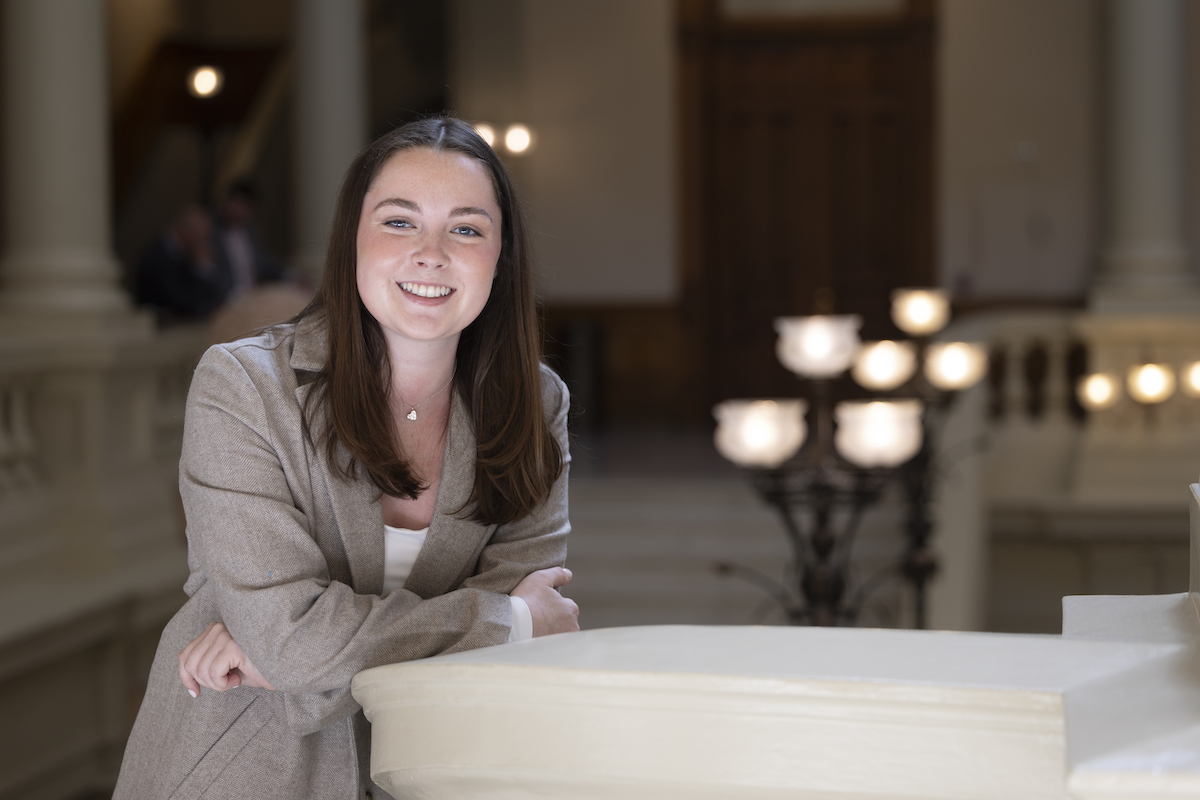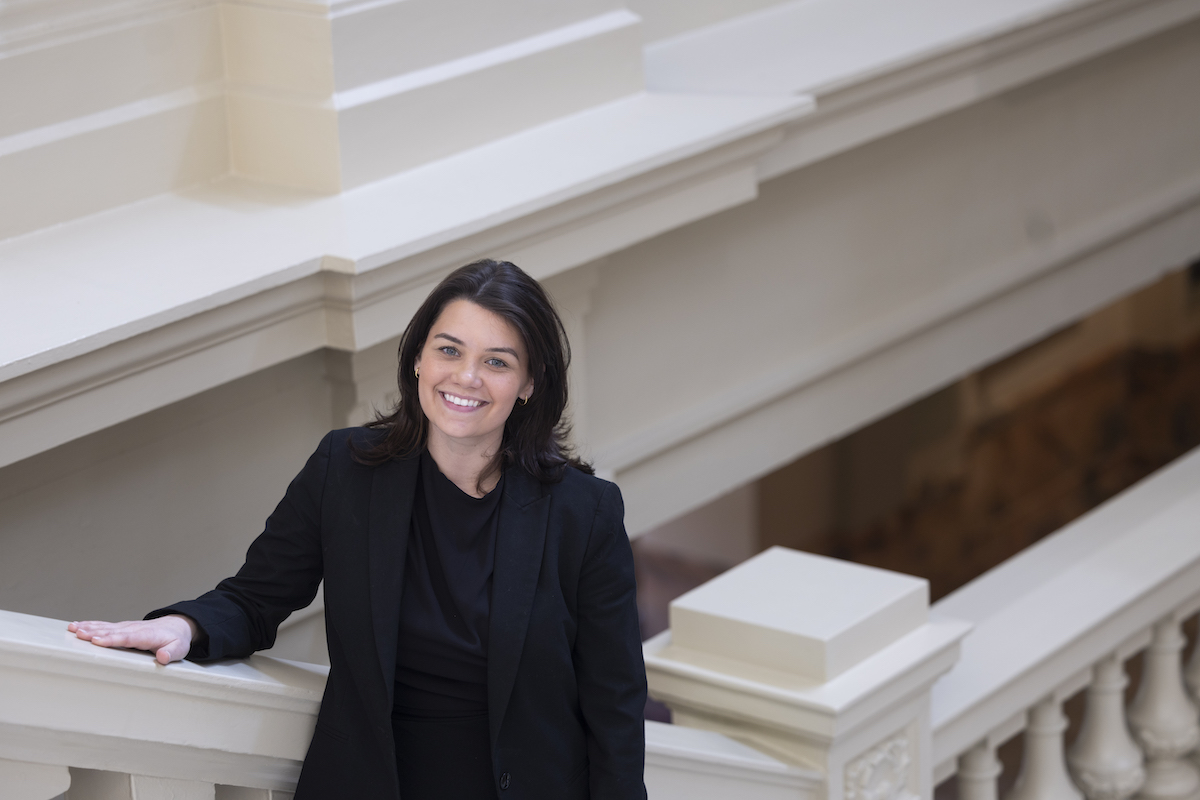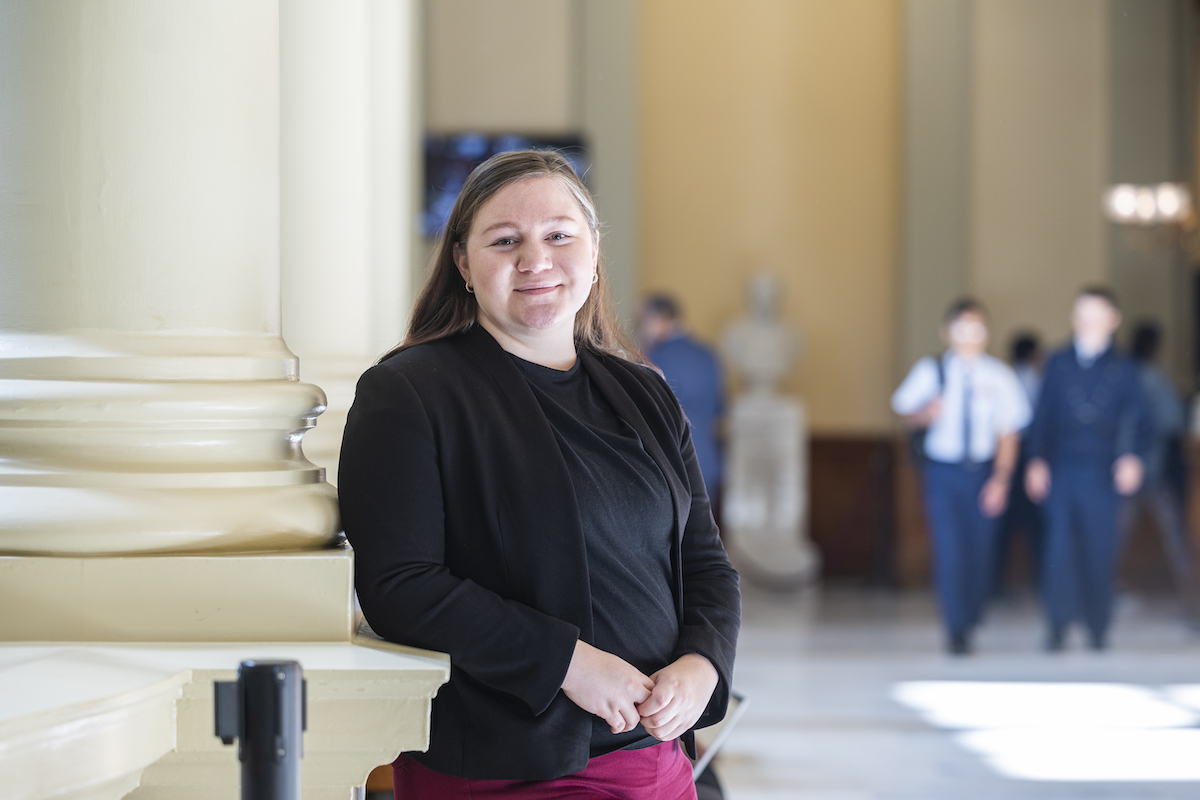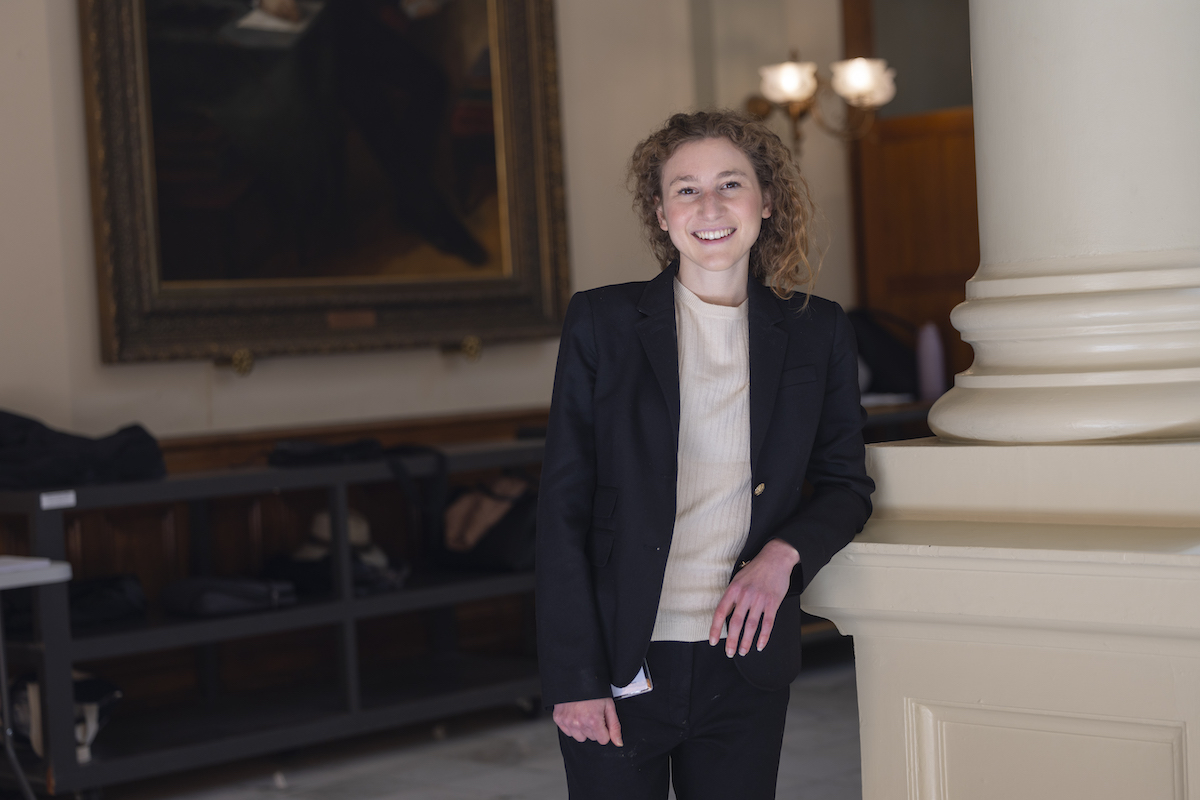“In this legislative session, we had an Emory physician come talk about biomarkers and why it is crucial that insurance cover testing for them. And a patient testified, noting that she would not be here without this testing.”
That marked a proud day in the life of Emlyn Langlieb, manager of state affairs for Emory’s Office of Government and Community Affairs (OGCA) and a 2022 graduate of Emory College of Arts and Sciences. Invaluable preparation for her career included an internship with State Senator Elena Parent, who represents District 42, which encompasses portions of central and north DeKalb County, including Emory’s Atlanta campus.
Through positions in her office, Parent has given a steady stream of Emory students the taste for government service that sometimes becomes lifelong and, in just about every case, develops key skills or sparks new interests.
“I am so lucky to have a world-class university in my district. Emory has been a terrific partner and resource,” Parent says. “My office has come to rely on the excellent Emory students who are interested in, and passionate about, our political system. They help with policy analysis, speeches, constituent communications and social media, all of which are essential to helping me serve as a state senator.”
Langlieb started working at Emory on the first day of the 2022 legislative session. “I took the adage of learning something new every day to an extreme on that day,” she laughs, acknowledging that the pace in the Georgia General Assembly is beyond hectic.
After the powerful testimony the Emory doctor and patient offered, Langlieb called her mother, sharing the big news but also conveying an unspoken thank-you.
Langlieb’s family talks a lot about finding your way in the world. She was surprised to find out that this was not a common family dinner conversation. “My parents taught me to be open and see where life takes you,” she says.
While majoring in economics at Emory, she interned for Parent in spring 2020 and considers her a role model. Tasked with helping generate the newsletters produced by Parent’s office, Langlieb says, “Providing someone with a key bit of knowledge that can unlock a problem they have been having was exciting. Something clicked, and I felt I was making a difference.”
Now, seeing her work with OGCA as “an opportunity to help both Georgia and Emory,” Langlieb says some things haven’t changed from her time as an intern.
“Surrounded by experts who have done it all before, I just try to soak in everything,” she explains.
The Emory DNA
There is no shortage of Emory students interested in trying out government service, and OGCA Vice President Cameron Taylor, herself an alumna, has a few thoughts about why.
“Emory has a long history of public service, whether it be the Peace Corps, AmeriCorps, Habitat for Humanity or something else. It feels like something in our DNA, both in the way we select the students who come here and how we nurture those interests,” she says.
Taylor’s first bite of this apple came in high school when she interned for Congresswoman Pat Schroeder.
“She was awesome to learn from because it was the 1980s and she was bending Capitol Hill norms as the first woman serving on the House Armed Services Committee. That was the beginning of my admiration for public service,” Taylor says.
“Through the years, I have helped Emory alumni find positions all over Capitol Hill. The Hill is a place where you can advance quickly, so I get a lot of satisfaction watching my mentees prosper,” she says.
Indeed, Taylor describes a recent meeting, one common for her office to arrange, involving 10 current Woodruff and Emory Scholars who had the chance to get to know alumni who also were scholars and now work on Capitol Hill. Following the conversation, fully half reported that they were considering internships.
Parent’s latest crop of capable assistants
Avery Rosen 25C completed an internship for course credit in Parent’s office this past spring semester. A quantitative theory and methods student on the policy-analysis track, Rosen is also a Middle Eastern and South Asian studies major who came to Emory in part because it offers meaningful ways to be politically active.
“The Young Democrats of Emory was one of the first communities I joined on campus, and everyone — including upperclass students — was so welcoming,” Rosen notes. After serving as the group’s voter-engagement director last year, she begins work as vice president in the fall.
Rosen served on Jen Jordan’s campaign for Georgia attorney general, doing donor research and planning fundraisers. It was an all-female-run campaign, about which Rosen comments: “It was such an empowering place to work and for such a great cause.”
Her political appetite thoroughly whetted, Rosen was eager to join Parent’s office as an intern doing social media work, researching the senator’s talking points and editing videos.
Given that Parent often makes time to speak with Emory’s Young Democrats, Rosen had met Parent several times before. As chair of the Georgia Senate Democratic Caucus, Parent has won Rosen’s admiration for “being the face of a lot that takes place on the Senate floor.”
Rosen’s work in Parent’s office ended with the recent close of the legislative session; she is looking forward to a semester abroad in London at the King’s College School of Public Policy but wants to be back on familiar soil as the primaries gear up.
Alyssa Achiron has just completed her second year at Emory School of Law and finished a semester learning the ropes of legislative process from Parent and her team through a legal externship.
“By submitting my resume to Senator Parent’s office,” she notes, “I hoped to find out whether I was interested in making my difference through politics. Would being a lawyer be enough for me?”
In work for her master’s degree, Achiron focused on political science and gender studies. What drew her to the law, she says, “was the ability to make a difference, especially for women.”
Achiron conducted research for Parent, helping with speeches, going to Legislative Council with her to discuss the wording of specific bills and sitting in on committee meetings the senator was too busy to attend.
“I picked this job,” Achiron says, “because Senator Parent is very vocal speaking in the well about things she is passionate about. I like the issues she fights for — education, gender issues and abortion rights.”
Achiron welcomed the opportunity to “get out of the law school bubble. Working for Senator Parent deepened my ties to where I live. As students, establishing that connection is not always easy, but this job made that possible.”
Lauren McHenry has many interests; in her words, narrowing them “was a little daunting.”
She worked on a judicial campaign as a University of Central Arkansas undergraduate and pronounces herself something of a politics geek, saying: “Normal 17-year-olds don’t talk to their parents about Supreme Court case history.”
McHenry just completed her second year at Emory Law. In three different capacities, in Arkansas and here, McHenry has done work associated with juvenile law. Reflecting on her service with Fulton County’s Office of the Child Attorney, McHenry says, “I will always appreciate the work they do, but I can’t be on the front lines. I don’t have the heart to do that every day.”
McHenry’s work in Parent’s office also was a legal externship. She describes Parent and the staff around her as an inspiration, saying, “They care about the issues, are well versed in them and always ready to dive in head first.”
Her role was to be the expert on the case law that might attend any policy decisions. Like Achiron, she would compile memos on bills that were being considered, asking questions such as: Have we had bills like this in the past? If so, are they working? Are they causing more harm than good? Do other states have similar statues? If so, how are they written?
It always ends with a bang
McHenry might have said it best when she commented that a legislative session is “four months of monumental change and churn.”
And the denouement is even more taxing: first there is “Crossover Day,” which occurred on March 6 — the final day for bills to pass out of the House or Senate in order to move forward in that session.
Then came “Sine Die” on March 30. The Latin phrase, meaning “without day,” signifies to politics watchers the end of a legislative session without a specific date being set for the next session. Sine Die, says McHenry, often bleeds over into the next day and “could easily require some Red Bull.”
State media keeps a close watch on the bills that passed — and those that didn’t. Charmingly, one that passed because of Parent’s intervention was “The Georgia Lemonade Act.”
The need for such legislation came into being when a constituent of Parent discovered that his kids’ lemonade business was illegal under Georgia law. Governor Brian Kemp signed Senate Bill 55 into law on May 3, allowing young entrepreneurs to cool us off in all the time-honored ways.
Taylor never tires of making connections for the Emory community to government, saying: “We welcome having students — as well as faculty and staff — contact our team to learn about our work.”
“The Emory students I have met over the years are optimistic and undaunted. They would be ideal public servants,” she says.
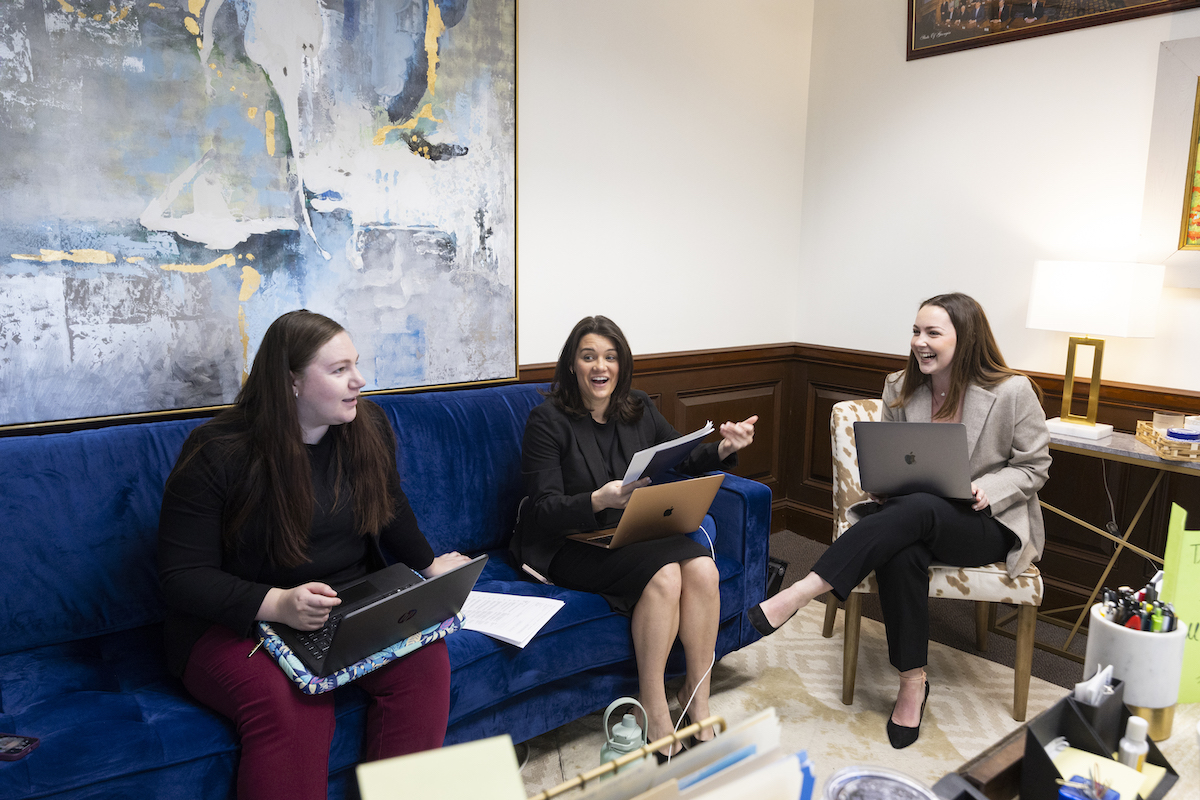
Thanking Emory for being “a terrific partner and resource,” Georgia State Senator Elena Parent employed three Emory students in the last legislative session.


